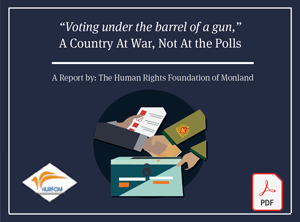Farmers in Mon State are in Trouble
January 4, 2010
Election preparations round off a year of abuses against farmers in Mon territory
January 3, 2010
Introduction:
As preparations by the Burmese State Peace and Development Council (SPDC) for the elections slated for 2010 mount, an increasing amount of pressure will be placed on already burdened rural agricultural communities in Mudon, Thanbyuzayat, Ye and Kyaikmayaw Townships. As previously noted in HURFOM’s October and November election reports, these preparations have targeted rural communities with the intention of securing political dominance in advance of the government’s announcement of the 2010 electoral rules. In taking farmers and community members from their time sensitive-cultivation and harvests of rice crops that are critical for community survival and economy, these preparations have place an excessive burden on agricultural populations.![]() Download report as PDF [ 328 KB] Read more
Download report as PDF [ 328 KB] Read more
The 2008 Constitution and the 2010 Elections: Without Inclusiveness, Problems Will Remain Unresolved
December 1, 2009
The general population of Mon State and other parts of Burma think that the 2010 elections, and any new transformation of power that might result from them, will just be like ‘putting old wine into the new bottle’. The “taste” will be the same, and their suffering of various political, economic, cultural, and human rights violations will be similar. Read more
National Politics Party, NUP and USDA Start a Secret Campaign for 2010 Elections
October 29, 2009
Unsurprisingly, Burma’s 2010 elections will not be free and fair, even though the ruling military government has yet to announce any restrictive or biased election laws, elections processes, or political party formation laws. The SPDC has already privileged the secret campaigns of certain military commanders, the National Politics Party (NPP), and other SPDC-supporting political groups like the National Unity Party (NUP), and the Union Solidarity and Development Association (USDA). Read more
Peaceful Spirit in September 2007
October 7, 2009
This September marks the 2nd anniversary of the Saffron Revolution, which recognizes the peaceful demonstration of Buddhist monks in 2007 and the brutal treatment they received from the ruling regime, the State Peace and Development Council (SPDC). The Buddhist monks were simply demanding peace, but the regime gave them riot police and soldiers with bullets and beating. Read more
Fracturing Ceasefires and Regional Security Threats
September 7, 2009
Burma’s ruling junta, the State Peace and Development Council (SPDC), has moved forward with its 7-points roadmap towards ‘Disciplined Democracy’ by pressuring ethnic armed opposition groups to participate in this political process without guarantee of any rights for their people. Read more
Wait and See for ASEAN Human Rights Commission
July 31, 2009
There are still many human rights violations committed by the State against its citizens in some ASEAN countries, especially Burma or Myanmar. While the ASEAN leaders are agreeing to form the ASEAN HR Commission, there is increased oppression by the SPDC against its opponents in Burma. Read more
SPDC’s will to oppose ‘National Reconciliation’
June 26, 2009
The international community has been paying serious attention to the trial against Burma prodemocracy
leader Daw Aung San Suu Kyi, but the military regime’s State Peace and Development Council
(SPDC) has tried to change that attention by attacking the Karen National Union (KNU)
and the Karen people. Read more
Outraged but not surprised
May 28, 2009
Daw Aung San Suu Kyi is on trial. The circumstances are unexpected — even ridiculous — but the trial should not be surprising. The Lady’s house arrest, which had already been extended once — illegally, was set to end with the month of May. Read more
Militarization in ethnic areas obstacle to national reconciliation
April 22, 2009
In order to have control over the different ethnic areas and the non-Burman population, the current military regime had adopted a policy of militarization. What is meant with this militarization policy?
First, the SPDC is deploying more military troops with various battalions and artillery regiments in the areas where the fighting happens and then moved thousands of troops to there. Then they also moved soldiers’ families and created soldiers’ villages. In order to create soldiers’ villages, they confiscate more land. Read more




















































